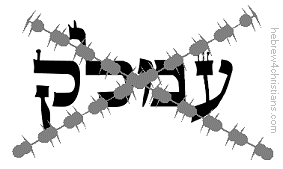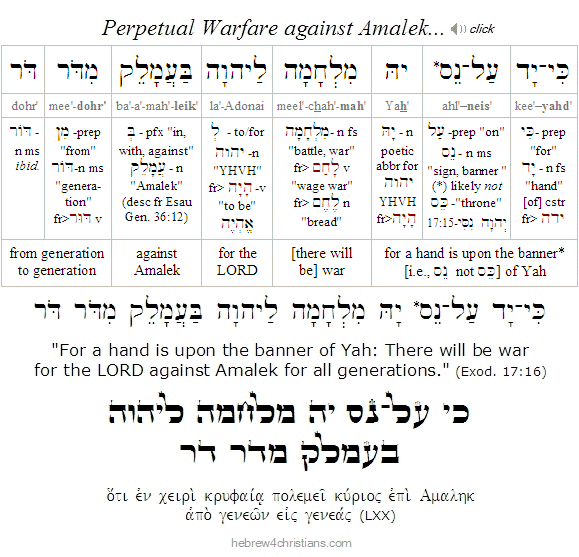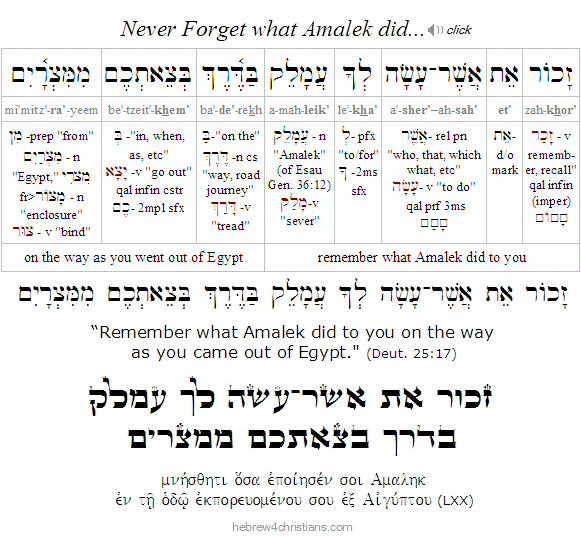|
The Shabbat that precedes the holiday of Purim is called Shabbat Zakhor - the "Sabbath of Remembrance." The Maftir (additional reading) is Deuteronomy 25:17-19 which describes the attack by the ancient tribe of Amalek when Israel first left Egypt:
Remember what Amalek did to you by the way, when you came forth out of Egypt; How he met you by the way, and struck at your rear, all who were feeble behind you, when you were faint and weary; and he did not fear God. Therefore it shall be, when the LORD your God has given you rest from all your enemies around, in the land which God gives you for an inheritance to possess, that you shall blot out the remembrance of Amalek from under heaven; you shall not forget.
To fulfill this commandment, the Sages prescribed the public reading of this passage on the Shabbat which precedes Purim so that the 'wiping-out' of Amalek might be connected with the 'wiping-out' of Haman the Agagite, i.e., a descendant of Amalek (Esther 3:1).

It is said that Amalek's great sin was that he taught the nations to disregard the LORD and not fear His Name. Thus Nechama Leibovitz writes, "After the Exodus mankind as a whole might have taken one great step further and acknowledged the sovereignty of the God of justice and truth, but then along came Amalek and unrestrained by the dread and awe that kept all the nations of the world in check showed the way for the others. What was there to fear? That a people had gone forth from the land of Egypt. Now they were wandering in the wilderness, weary and struggling. Why should they not be attacked? This was the way of the world. The world returned to its former rut."
Amalek may have been a grandson of Esau and chief of an Edomite tribe (Gen. 36:12, 16), though he is also described as "first among the nations," perhaps predating the time of Abraham (Gen. 14:7, Num. 24:20). To this day, the soferim (scribes) blot out the name Amalek to test their quill before writing a Torah scroll, and the Amalekites are regarded as the perpetual enemies of Israel. Haman, Hitler, and other anti-Jewish people are often referred to as "Amalekites" in Jewish tradition.
 |
Just as we are commanded to remember (ū¢ųĖūøūĢų╣ū©) the Shabbat to keep it holy (Exod. 20:8); to remember (ū¢ųĖūøūĢų╣ū©) the day on which you went free from Egypt (Exod. 13:3), and to remember (ū¢ųĖūøūĢų╣ū©) what God did to Miriam (Deut. 24:9), so we are commanded to remember (ū¢ųĖūøūĢų╣ū©) what Amalek did to Israel. Indeed, the Torah adds that we are to "blot out" the remembrance of Amalek from under heaven, stressing "you shall not forget it." The Greek LXX uses a "double negative" subjunctive construction: ╬┐ßĮÉ ╬╝ßĮ┤ ß╝ÉŽĆ╬╣╬╗ßĮ▒╬Ėß┐ā, "You shall not, no not, forget [i.e., to blot out the name]." There is a paradox here, since how can the memory be blotted out if we yearly recall it? Remember...to forget! If God wanted the Amalekites to be forgotten, then why mention their name? This is similar to the so-called "Liar's Paradox" (Titus 1:12). If all Cretans are liars, and a Cretan then says he's a liar, is he then telling the truth? Likewise, if we fulfill this commandment do we not fail to fulfill it?
The verb translated "blot out" (ū×ūŚūö) probably comes from the idea of erasing a scroll by washing or sponging off the ink (rather than by "blotting" or making it illegible). Names from Sefer ha-chaim (ūĪųĄūżųČū© ūöųĘūŚųĘūÖų╝ų┤ūÖūØ), the Book of Life, are therefore said to be erased (Psalm 69:29, Rev. 20:15). The verb is used elsewhere in Scripture to mean wiping the mouth clean (Prov. 30:20), wiping away tears (Isa. 25:8), wiping out names (Exod. 32:32, Deut. 9:14, 25:9), wiping out memories (Exod. 17:14, Deut. 25:19), wiping out sins (Isa. 43:25; Psalm 51:3,11, Zech. 3:9), and even annihilating all signs of life (Gen. 6:7).
It should be obvious that "Amalek" denotes more than a particular tribe that attacked the children of Israel, but rather represents the collective "children of darkness" and servants of evil that abound in the world. In Augustine's terms, Amalek represents the "City of the World," whereas Israel represents the "City of God."
The name "Amalek" (ūóų▓ū×ųĖū£ųĄū¦) begins with the letter Ayin (symbolizing the eye) and equals 240 in gematria -- the same value for safek (ūĪųĖūżųĄū¦), the Hebrew word for doubt. Amalek therefore suggests "the eye of doubt," or even "the severed eye" (the Hebrew verb ū×ųĖū£ųĖū¦ means "to chop" or "sever" in reference to the "eye" of Ayin). Amalek therefore represents spiritual blindness as it acts in the world...
Wiping out Amalek, then, is a call to spiritual warfare... It is a call to show compassion and kindness to those whom the "Amalekites" seek to destroy. On the surface it might seem high-minded to show tolerance and love for others who openly engage in evil and attack God's people and truth, but such acquiescence is actually a form of spiritual complicity. Showing compassion to the wicked is a form of wickedness itself. We are called to resist the devil and earnest contend for the faith (2 Cor. 10:4, Eph. 6:12, 2 Tim. 3:8, Jude 1:3)... "Turning the other cheek" refers to personal offenses for the sake of righteousness, not to turning a blind eye to issues relating to social justice and truth.

It was because of this attitude of pseudo-compassion that the sages say Saul lost his position as King of Israel. Recall that Saul acted compassionately to Agag, King of Amalek and did not kill him as he was instructed (see 1 Sam. 15). The sages wrote in Tractate Yomah (22b), "When God said to King Saul: 'Go and wipe out Amalek,' he replied: 'For the murder of one soul, the Torah required the [intricate ceremony of] neck-breaking of a heifer, ['eglah arufah'], for all of these souls [that you have instructed me to kill] how much more so would [such atonement be required!], and even if human members of that nation sinned, in what way did the animals sin [that I should be obligated to kill them]? And if the adults sinned, why do the children deserve to die?' A Heavenly Voice descended from on High and said: 'Don't be too much of a Tzaddik (Righteous person).'"
The sages were being ironic, of course. At that time in Israel's history, the genuinely compassionate action meant dealing with God's enemies forcefully, not with a sense of the universal brotherhood of man in mind.... Besides, who knows true compassion but the LORD God Himself (Psalm 97:10)?
The Targum Yonatan says, "you shall blot out the memory of Amalek from under the heavens; but of the days of the King Messiah you shall not be unmindful." The commandment to "blot out" Amalek ultimately will ultimately be fulfilled in the Messianic Kingdom to come, "when the LORD your God has given you rest from all your surrounding enemies in the land the LORD your God is giving you as your inheritance to possess" (Deut. 25:19). At that time all memory of Amalek will be "blotted out" from under heaven just as God will "wipe away" all tears from our eyes... This is a glorious truth we should never forget, despite the condition of this world and the apparent upper hand of the "Amalekites." As the Festival of Purim also reminds us, "salvation belongs to the LORD" / ū£ųĘūÖūöūĢųĖūö ūöųĘūÖų░ū®ūüūĢų╝ūóųĖūö.
Though we are "in" the world, we are not "of" it, and we serve a Great King to whom all the princes of this age will one day give account. Amen. Maran Ata Yeshua!
Hebrew Lesson
Exodus 17:16 Hebrew reading (click):
 |
Hebrew Lesson
Deut. 25:17 Hebrew reading and podcast:
|






